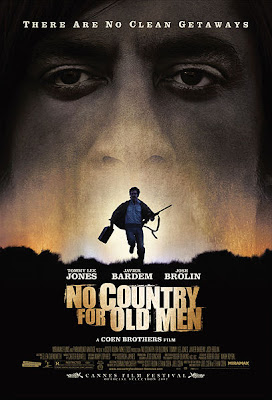So the first must see movie of the year arrives early enough to coincide with everybody’s New Year’s resolutions, when everyone is still trying to keep things tidy before the wheels inevitably fall off the wagon. It also arrives in time to make us realise just how barren the last couple of years have been in the movie theatre. I can’t really remember the last film someone demanded I go and see something on the big screen for the full, deep hit experience of seeing a film (my little brother insisting on Spiderman 3 doesn’t count as it was utter shit). “No Country For Old Men”, released mid January, is such a film, one you should make the time, spend the cash, get the sitter, put the effort in for. It’s made by The Coen Brothers and is the film that finally sees off a particularly dry patch for them – so much so, it’s arguable as to whether this is actually their best film to date.
“No Country…” is brooding, pensive and at times shocking in its vindictive acts of violence. It is evocative of the Coen’s own “Blood Simple” alongside Peckinpah’s westerns. That’s no faint praise on either count. The most recognisable face on screen is Tommy Lee Jones, who plays a sheriff, disillusioned and facing down retirement, much reminiscent of his role as Pete Perkins in the ridiculously underrated “Three Burials Of Melquiades Estrada” (as to why that one got away – well, I imagine people must have walked up the Odeon ticket desk or the counter at Blockbuster, paused, worked the title round their mouth a few times and then realised it was easier to ask for the new Harry Potter instead). The rest of the cast is made up of tip-of-the-tongue names, no one so famous as to overshadow the film itself (lest we forget, the Coen’s have revelled in their biggest outsiders status for years, employing the likes of George Clooney, Catherine Zeta Jones and Tom Hanks to increasingly less success with each film – “The Ladykillers”, anyone?). Javier Bardem’s turn as an almost alien assassin (in a Bowie “Man Who Fell To Earth” kind of way) is Oscar worthy, even if just for the haircut – how a Beatles mop top might look placed on the head of a Mexican wrestler. Thankfully, it takes about 15 seconds for the haircut to fade into insignificance and for the full throttle insanity of the character is revealed and allowed a demented free reign of psychopathic activity. Perhaps most brilliantly, the film features no incidental music whatsoever. As a result, the tension is ratcheted up in your own mind, there are no directions or signposts from orchestras or metal bands churning away. Even the credits roll in a morbid silence. I’m sure it’s not the first time that such a sleight of hand has been used in a motion picture, but in this context, it is a truly genius move that actually sets the brain working, rather than just receiving information.
The unspoken, unseen star of “No Country…” has to be the writer on whose book the film is based, the reclusive, Pulitzer Prize winning author Cormac McCarthy. Although the first post-film credit says “written for screen by Joel and Ethan Coen”, anyone who has read the book will realise that their source material was pretty much bombproof when they arrived at it. McCarthy’s book is sinewy, direct and visually evocative to an almost hallucinatory point. Structurally, it’s odd, in that it doesn’t play out as you’d expect, something that the Coen’s have bravely replicated, controversial coda and all. As with much of McCarthy’s books, there is no flab, there are no wasted words. The Coen’s have tapped the source material to career-best effect, reigning in any of their cinematic quirks or idiosyncrasies to let the dialogue speak for itself, all Texan and hard boiled like tar. The best lines, lifted as they are directly from the book, would still sound like rough cut pearls of wisdom in a school production. This is not to take away any achievement from the Coen’s – they recognized the book’s “pitiless quality… (and the fact that) McCarthy did not follow through on formula expectations” and have breathed cinemascope life into one of the most startling pieces of fiction I’ve read in the last few years. In “No Country For Old Men”, by bringing McCarthy’s world to the screen, they have pulled off no lesser feat than making themselves relevant again. Got to say it’s good to have them back.
By the way, if the film leads you to explore McCarthy’s work any further, I’d highly recommend the bleak frontier country western novel “Blood Meridian” alongside “The Road”. “The Road”, a stunningly powerful and almost overbearingly desolate novel, is being filmed for the big screen by “The Proposistion” director John Hillcoat. If you’ve read the book and seen that film, you’ll know what a ride you’re in for…
Robin Turner
